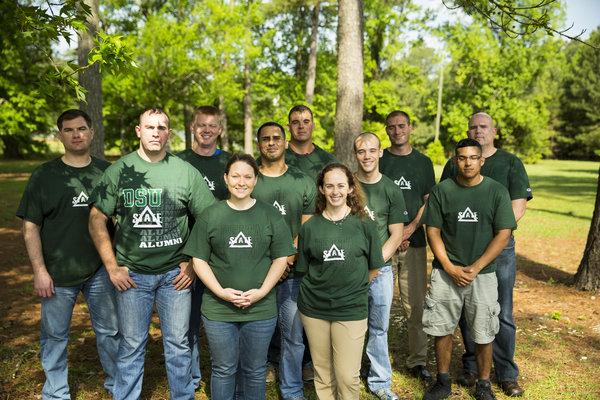United States Marine Corps Partners with Delta State GIT Program

Photo of Marines by Hannah Kistemaker
“This program is the first of its kind,” says Chris Smith, the program manager in the Center for Interdisciplinary Geospatial Information Technologies at Delta State University.
Delta State University partnered with the United States Marine Corps this school year. This program was created in order to not only benefit Delta State, but also to benefit the United State Marine Corps. The program was a major force behind the development and accreditation of a new degree: a Bachelor of Applied Science in Geospatial Analysis and Intelligence.
The partnership with the United States Marine Corps does several things for campus. One, enrollment in the school increases since the program brought Marines to attend full time. Secondly, it also brought the school to the attention of friends and family of Marines eligible for the program. Finally, the partnership with USMC created more opportunities for perspective students in and out of the Marines.
The Marine Corps benefitted from this partnership by the Marines sent to Delta State. The Bachelor of Applied Science in Geospatial Analysis and Intelligence (BASGAI) degree provided students with a combination of studies in the class room and through experience in the field. This field experience was accomplished through an internship with the GIT Center on campus.
As of this year, three Marine Corps Reservists were enrolled as full time students at Delta State through this program: Warren Rybczynski, Cody Callender, and Tanner Overcash. When asked about how this program will affect his career, Rybczynski stated, “I will learn things that I cannot learn anywhere else. It will open doors that I cannot open on my own and I will learn fantastic things that will make me a professional in this job field.”
Marines in the program acquire a degree that emphasize the knowledge required to efficiently operate in their assigned Military Occupational Specialty (MOS). The program also gave Marines the opportunity to use their education in the civilian world.
Graduates from this degree will be prepared to start careers with U.S. intelligence services, the Department of Defense, the Department of Homeland Security, FEMA, and other high level government regulated departments. Delta State University’s effort towards this accomplishment was recognized by the National Geospatial Intelligence Agency and the US Geological Survey who selected the Center as one of 17 Centers of Academic Excellence.
“Geospatial technologies have long been at the core of many decision making processes, particularly in the intelligence, critical infrastructure, investment, and insurance industries,” Talbot Brooks, the Center Director, said. “The ‘where’ component is a key piece of information–‘Where is the bad guy?’, ‘Where is the competition?’, ‘Where are risks the greatest?’, and similar are all important questions and provide key insights about why, when, or how something happens. The ability to analyze and apply spatial information to the decision making process provides a significant competitive advantage, not just to our intelligence services and military, but American businesses.”

Hannah is a junior digital media arts major from Mooresville, N.C. She shares the role of editor-in-chief of The Statement with Nick Houston. Her job...


